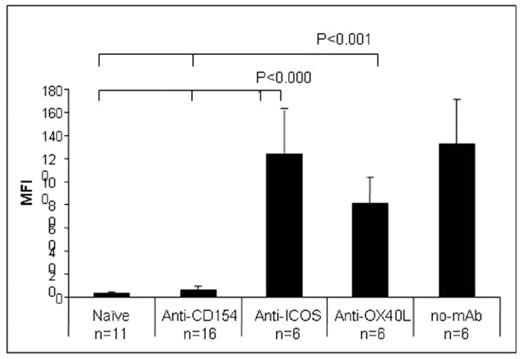Abstract
Introduction: Recipient sensitization is one of the most critical problems facing clinical transplantation. Patients with sickle cell disease are presensitized to HLA-alloantigens from chronic transfusion therapy. These allosensitized recipients experience a higher failure rate in engraftment and require more intense conditioning. A method to prevent sensitization would have a significant impact on transplant outcomes in these recipients. We have identified that B-cell responses and humoral immunity are the dominant factor in sensitization to MHC alloantigens. T-cell-dependent B-cell responses require physical cell:cell contacts that drive the different steps of B-cell differentiation to memory B-cells or to Ab-producing cells. Several signal pathways have been identified that are important for initiation of B-cell differentiation, including costimulation through the CD28/B7 or TNF/TNFR families. Here, we examined whether blocking the costimulatory interaction between T- and B-cells with anti-CD154, anti-OX40L, or anti-ICOS during exposure to alloantigen would prevent allosensitization.
Methods: B6 (H-2b) mice received allogeneic BALB/c (H-2d) skin grafts on day 0 and were treated with anti-CD154 (day 0 and day +3), anti-OX40L (day 0 to +4), or anti-ICOS (day +4, 6, 8 and 10). Anti-donor specific antibodies were measured by flow cytometry cross-match assay 4 weeks after skin grafting and reported as mean fluorescence intensity (MFI).
Results: Recipients treated with anti-CD154, anti-OX40L, or anti-ICOS rejected BALB/c skin grafts with a time course similar to normal B6 controls (12.7±2.4 days). The anti-donor antibody titer in mice treated with anti-CD154 (5.9±3.9) was slightly, but not significantly (P>0.05) higher than for naïve mice (3.8±0.6). Levels of allospecific Ab were markedly higher in mice treated with mAb anti-ICOS (123.6±38.1; P<0.001) and anti-OX40L (80.6±23.3; P<0.0001) compared with naïve controls or anti-CD154 treated animals. The Ab level in mice treated with mAb anti-ICOS was similar to sensitized controls (skin grafting only without mAb treatment; MFI: 132.6±38.5; P=0.69). The anti-donor Ab in mice treated with mAb anti-OX40L was significantly lower (P=0.02) compared to sensitized controls, but the difference was much more significant when compared with naïve controls. To evaluate sensitization in vivo, mice were conditioned with 950 cGy and transplanted with 15×106 of BALB/c BM cells 5–7 weeks after skin grafting. As expected, engraftment did not occur in sensitized control mice (no Ab treatment). Engraftment also did not occur in mice treated with anti-ICOS. Only 16.7% of mice engrafted with anti-OX40L treatment. In contrast, 75.0% of mice engrafted with anti-CD154 treatment.
Conclusion: Blocking molecular interactions between CD40/CD154 abrogated the generation of antibody against donor antigens. The CD154 blockade effect on Ab production was specific and not a general feature of co-stimulatory blockade, as blockade of ICOS or OX40L did not completely inhibit Ab generation. These data suggest that the engagement of B-cell molecule CD40 and its ligand CD154 plays a central role in T-cell-dependent B-cell responses. These findings could have a significant impact on management of sensitized recipients in the clinic.
Author notes
Disclosure: No relevant conflicts of interest to declare.


This feature is available to Subscribers Only
Sign In or Create an Account Close Modal